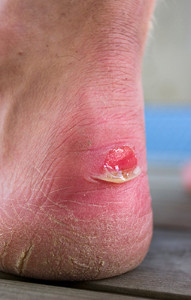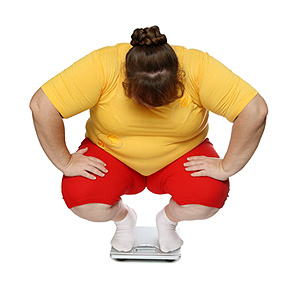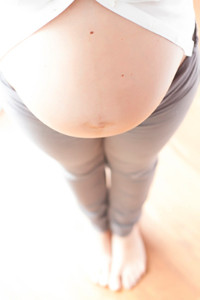





 Typically, blisters on the feet are caused by repeated friction, commonly due to wearing poorly fitting shoes. Occasionally, there may be other conditions present such as hammertoes or bunions, which may alter the structure of the foot. Blisters can be avoided by choosing shoes with a wide area for the toes, in addition to checking the lining of the shoe, confirming that the seams are not raised. This ailment is more likely to develop if the feet are moist, which typically softens the skin. This may cause the skin to tear, providing the right environment for blisters to form. If you discover that you have a blister, it may be beneficial to cover it with a bandage in addition to eliminating any friction by wearing shoes that fit correctly. Typically, it’s not recommended to pop a blister, because this may lead to infection. If you have blisters on your feet, please consider scheduling a consultation with a podiatrist for a proper evaluation and treatment options.
Typically, blisters on the feet are caused by repeated friction, commonly due to wearing poorly fitting shoes. Occasionally, there may be other conditions present such as hammertoes or bunions, which may alter the structure of the foot. Blisters can be avoided by choosing shoes with a wide area for the toes, in addition to checking the lining of the shoe, confirming that the seams are not raised. This ailment is more likely to develop if the feet are moist, which typically softens the skin. This may cause the skin to tear, providing the right environment for blisters to form. If you discover that you have a blister, it may be beneficial to cover it with a bandage in addition to eliminating any friction by wearing shoes that fit correctly. Typically, it’s not recommended to pop a blister, because this may lead to infection. If you have blisters on your feet, please consider scheduling a consultation with a podiatrist for a proper evaluation and treatment options.
Blisters are prone to making everyday activities extremely uncomfortable. If your feet are hurting, contact one of our podiatrists of Active Foot and Ankle Care, LLC. Our doctors can provide the care you need to keep you pain-free and on your feet.
Foot Blisters
Foot blisters develop as a result of constantly wearing tight or ill-fitting footwear. This happens due to the constant rubbing from the shoe, which can often lead to pain.
What Are Foot Blisters?
A foot blister is a small fluid-filled pocket that forms on the upper-most layer of the skin. Blisters are filled with clear fluid and can lead to blood drainage or pus if the area becomes infected.
How Do Blisters Form?
Blisters on the feet are often the result of constant friction of skin and material, usually by shoe rubbing. Walking in sandals, boots, or shoes that don’t fit properly for long periods of time can result in a blister. Having consistent foot moisture and humidity can easily lead to blister formation.
Prevention & Treatment
It is important to properly care for the affected area in order to prevent infection and ease the pain. Do not lance the blister and use a Band-Aid to provide pain relief. Also, be sure to keep your feet dry and wear proper fitting shoes. If you see blood or pus in a blister, seek assistance from a podiatrist.
If you have any questions, please feel free to contact our offices located in Fair Lawn, Riverdale, and Englewood, NJ . We offer the newest diagnostic and treatment technologies for all your foot care needs.
Read more about Blisters on the Feet Scientists from Baylor College of Medicine believe iberiotoxin, a toxin from the venom of the Indian red scorpion, may be able to treat rheumatoid arthritis because of the benefits it may have. Iberiotoxin has a natural ability to block potassium channels in cells. These cells are active in RA, which may damage joints and prompt immune cells to cause inflammation. This toxin may have little or no side effect, and an added benefit may be that other channels or nerves may not be affected. Knowing all of this information, researchers then tested the toxin on rat models. The results were what they were hoping for. The substance stopped the progression of the disease and improved joint mobility. Their research later went on to be published in the Journal of Pharmacology and Experimental Therapeutics.
Scientists from Baylor College of Medicine believe iberiotoxin, a toxin from the venom of the Indian red scorpion, may be able to treat rheumatoid arthritis because of the benefits it may have. Iberiotoxin has a natural ability to block potassium channels in cells. These cells are active in RA, which may damage joints and prompt immune cells to cause inflammation. This toxin may have little or no side effect, and an added benefit may be that other channels or nerves may not be affected. Knowing all of this information, researchers then tested the toxin on rat models. The results were what they were hoping for. The substance stopped the progression of the disease and improved joint mobility. Their research later went on to be published in the Journal of Pharmacology and Experimental Therapeutics.
Because RA affects more than just your joints, including the joints in your feet and ankles, it is important to seek early diagnosis from your podiatrist if you feel like the pain in your feet might be caused by RA. For more information, contact one of our podiatrists of Active Foot and Ankle Care, LLC. Our doctors will assist you with all of your podiatric concerns.
What Is Rheumatoid Arthritis?
Rheumatoid Arthritis (RA) is an autoimmune disorder in which the body’s own immune system attacks the membranes surrounding the joints. Inflammation of the lining and eventually the destruction of the joint’s cartilage and bone occur, causing severe pain and immobility.
Rheumatoid Arthritis of the Feet
Although RA usually attacks multiple bones and joints throughout the entire body, almost 90 percent of cases result in pain in the foot or ankle area.
Symptoms
Diagnosis
Quick diagnosis of RA in the feet is important so that the podiatrist can treat the area effectively. Your doctor will ask you about your medical history, occupation, and lifestyle to determine the origin of the condition. Rheumatoid Factor tests help to determine if someone is affected by the disease.
If you have any questions please feel free to contact our offices located in Fair Lawn, Riverdale, and Englewood, NJ . We offer the newest diagnostic and treatment technologies for all your foot and ankle needs.
 Recent research has shown that a strong connection exists between conditions concerning the feet and obesity. The feet and ankles experience excessive stress from bearing the body’s additional weight, and concerns such as arthritis and heel pain can be commonplace. The tendons and ligaments may also be affected, and this may possibly cause the desire to exercise to gradually diminish as the weight increases. When foot pain exists, mobility may lessen, and this is often a result of the added pressure the bones of the foot must endure. Being obese may cause a multitude of foot issues, including fallen arches, gout, and tendonitis. If you are affected by this condition, wearing the correct shoes may aid in maintaining comfort. These may include choosing shoes that are wide enough and have ample support, in addition to having proper flexibility and cushioning. It’s advised to schedule a consultation with a podiatrist if you are affected by obesity and have foot or ankle pain.
Recent research has shown that a strong connection exists between conditions concerning the feet and obesity. The feet and ankles experience excessive stress from bearing the body’s additional weight, and concerns such as arthritis and heel pain can be commonplace. The tendons and ligaments may also be affected, and this may possibly cause the desire to exercise to gradually diminish as the weight increases. When foot pain exists, mobility may lessen, and this is often a result of the added pressure the bones of the foot must endure. Being obese may cause a multitude of foot issues, including fallen arches, gout, and tendonitis. If you are affected by this condition, wearing the correct shoes may aid in maintaining comfort. These may include choosing shoes that are wide enough and have ample support, in addition to having proper flexibility and cushioning. It’s advised to schedule a consultation with a podiatrist if you are affected by obesity and have foot or ankle pain.
Obesity has become very problematic at this point in time and can have extremely negative effects on the feet. If you’re an obese individual and are concerned about your feet, contact one of our podiatrists from Active Foot and Ankle Care, LLC. Our doctors can provide the care you need to keep you pain-free and on your feet.
Obesity and Your Feet
Since your feet are what support your entire weight when standing, any additional weight can result in pain and swelling. Being overweight is one of the main contributors to foot complications.
Problems & Complications
Extra Weight – Even putting on just a few extra pounds could create serious complications for your feet. As your weight increases, your balance and body will shift, creating new stresses on your feet. This uneven weight distribution can cause pain, even while doing the simplest tasks, such as walking.
Diabetes – People who are overweight are at serious risk of developing type-2 diabetes, which has a drastic impact on the health of your feet. As you get older, your diabetes might worsen, which could lead to loss of feeling in your feet, sores, and bruises. You could also become more prone to various infections.
Plantar fasciitis – Pressure and stress that is placed on muscles, joints, and tendons can trigger plantar fasciitis, which is an inflammation of tissue that forms along the bottom of the foot.
If you have any questions please feel free to contact our offices located in Fair Lawn, Riverdale, and Englewood, NJ . We offer the newest diagnostic and treatment technologies for all your foot and ankle needs.
Read more about How Obesity Affects Your Feet It’s common for women who are pregnant to experience swelling and discomfort associated with their feet. Excessive sweating is a typical condition many pregnant women struggle with, and it may result in fungal infections that can occur as a result of excess moisture accumulating between the toes. Keeping the feet healthy, especially during pregnancy, is vital for the general well-being of the body. Performing stretching techniques may aid in preparing the feet to accommodate the additional weight that will be carried during the pregnancy. It’s suggested that incorporating moderate exercise into your daily routine may possibly avoid any numbness occurring in the feet due to excessive inactivity. The choice to avoid wearing high heels is often a wise decision.
It’s common for women who are pregnant to experience swelling and discomfort associated with their feet. Excessive sweating is a typical condition many pregnant women struggle with, and it may result in fungal infections that can occur as a result of excess moisture accumulating between the toes. Keeping the feet healthy, especially during pregnancy, is vital for the general well-being of the body. Performing stretching techniques may aid in preparing the feet to accommodate the additional weight that will be carried during the pregnancy. It’s suggested that incorporating moderate exercise into your daily routine may possibly avoid any numbness occurring in the feet due to excessive inactivity. The choice to avoid wearing high heels is often a wise decision.
Pregnant women with swollen feet can be treated with a variety of different methods that are readily available. For more information about other cures for swollen feet during pregnancy, consult with one of our podiatrists from Active Foot and Ankle Care, LLC. Our doctors will attend to all of your foot and ankle needs.
What Foot Problems Can Arise During Pregnancy?
One problem that can occur is overpronation, which occurs when the arch of the foot flattens and tends to roll inward. This can cause pain and discomfort in your heels while you’re walking or even just standing up, trying to support your baby.
Another problem is edema, or swelling in the extremities. This often affects the feet during pregnancy but tends to occur in the later stages.
How Can I Keep My Feet Healthy During Pregnancy?
If you have any questions please feel free to contact our offices located in Fair Lawn, Riverdale, and Englewood, NJ . We offer the newest diagnostic and treatment technologies for all your foot and ankle needs.






